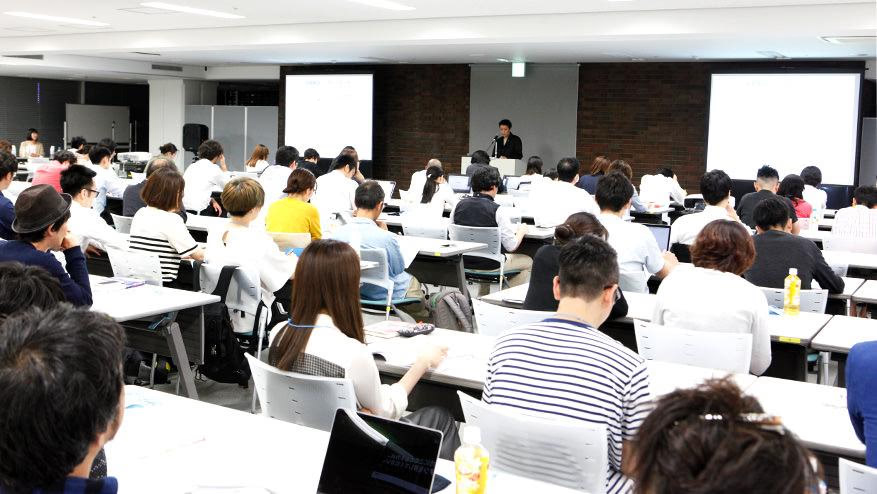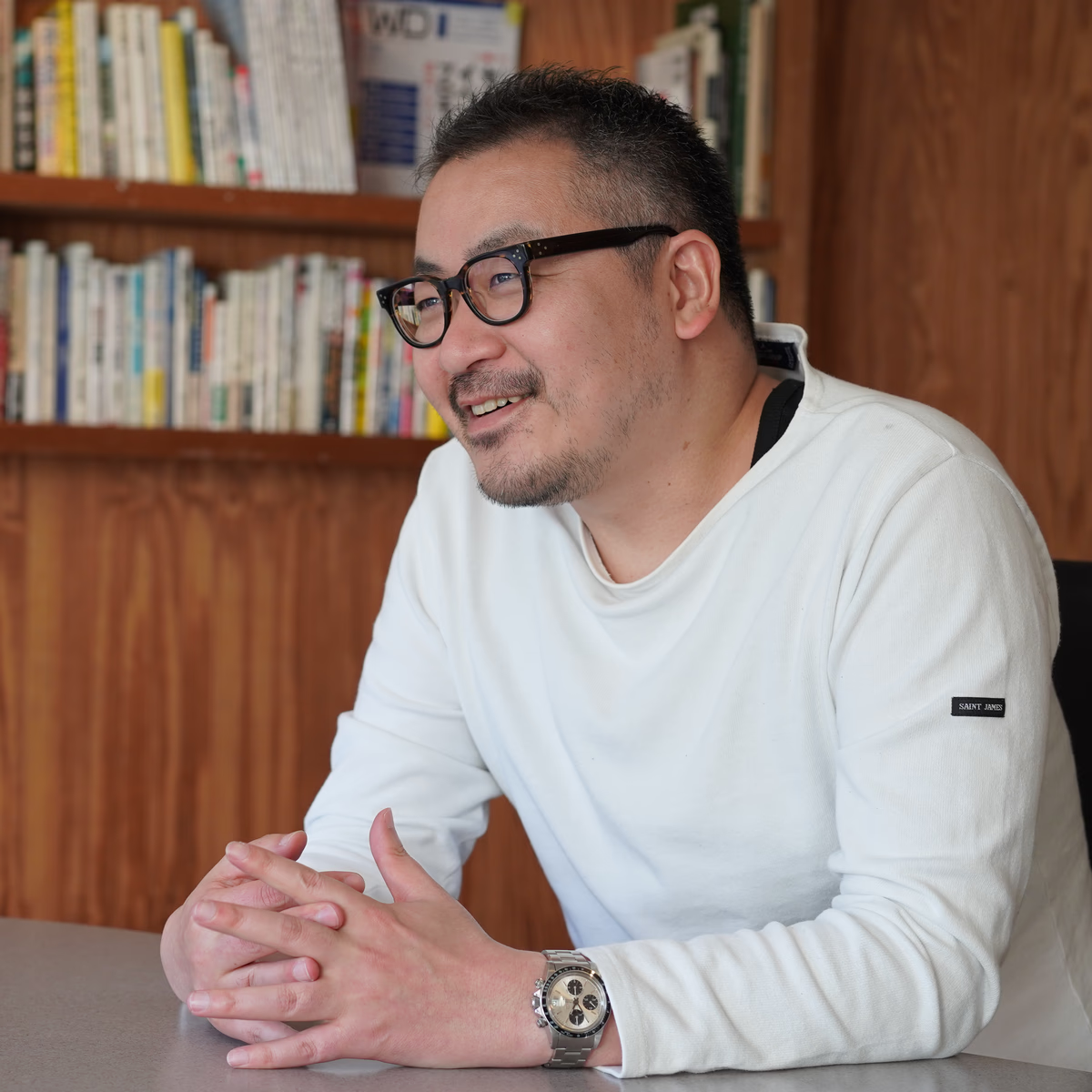こんにちは。
マーケティング部部長の龍田です。
2017年4月26日にコーディングファクトリー初の書籍を発売しました。
2007年のサービスインから、10周年を迎えるコーディングファクトリー(以下 CF )。
そのメモリアル Yearに、まさにこれまでの集大成と言える書籍を発売することができました。
そして、2017年6月19日。その出版を記念したセミナーを開催しました。
8月に大阪での開催も決定した出版記念セミナーを通して、セミナーにかける CF の想いを紹介してみたいと思います。
→【8月7日:大阪開催決定】出版記念セミナーの詳細はこちら。
CFセミナーの歴史。
CFは、「最低、1年に1回セミナーを開催すること」を目標としています。
初めてセミナーを開催したのは、2009年でした。参加人数は14名、代々木オフィスの大会議室で開催したのが最初です。
それから、数えること7テーマ、開催回数にして28回、参加人数は延べ2,200名に集まっていただき、全国でセミナーを開催をしてきました。
この歴史の中で、転換点となり、その後に大きな影響を与えることになったセミナーがあります。
それが、2011年に開催したコーディングガイドラインセミナーです。
このセミナーは、3年間にわたって定期的に開催し、合計1,043名の方に集まっていただきました。
まさに大成功をおさめたこのセミナーは、CFの事業展開においても大きな意味を持ちました。Web業界での認知度が急激に上がるキッカケになり、「 CFと言えば、ガイドライン」と言われる程のインパクトがありました。
今の事業基盤をつくったセミナーとも言えます。
そして、コーディングガイドラインセミナーには、もう一つの大きな意味があります。
それは、コーダーが講師を務めるようにようになったということです。
それまでのセミナーは、代表の林・副社長の永井が講師を務めてきました。人前で話すことに慣れた人たちです。
それを、このセミナーからコーダーが務めることにしました。
プログラミングの仕事をするコーダーは、いわゆる技術職です。
人前で話をした経験もないし、決して得意分野ではありません。
今では、コーダーがセミナー講師を務めることは、当たり前になりました。
しかし、当時は、講師を務めるコーダーにとっても、セミナーを監修するマネージャーにとっても、本当に覚悟のいる決断でした。
セミナーの準備に要する労力は、それまでのセミナーとは、比較にならない程、大変でした。
未経験であるが故の、緊張やプレッシャーとも戦わなくてはいけません。
テキストや台本をつくりこめば、話慣れた人間が代わりに話すこともできるかもしれません。
しかし、2011年以降、コーダーがセミナーで話すことにこだわっています。
なぜ、コーダーが話すことにこだわるのか?
少し角度を変えて、話をしてみます。
人前で話す機会が多い筆者のもとには、こんな相談がよくきます。
「(セミナー・プレゼン・朝礼等々)人前で話すときに緊張してしまう。どうしたら、緊張せずに話せるようになりますか?」
というものです。
その時に決まって答えることがあります。
「緊張した方がいい。緊張しないと、伝わらない。自分も今でもちゃんと緊張してる。」
ということです。
緊張するから、準備をがんばるし、緊張するから、一生懸命話しができるのです。
そして、結果的に一生懸命話すから人に伝わるのです。
人前で話すときに、「緊張せずに話すべき」とか、「噛んだらダメ」とか、「つまったらダメ」とか、「スラスラしゃべれないとダメ」というのは、強迫観念にも似た一種のステレオタイプの”誤解”なのです。
ちなみに、筆者もその誤解を持っていた一人です。
それが誤解なのではと思ったのは、社会人2年目でした。
元々コンサルティング会社にいた筆者は、人前で話す機会がすごく多くありました。
例に漏れずに、どうすれば緊張せずにしゃべれるんだろうと考えていました。
そんな時に、たまたま、テレビでこんな話を連続して見ました。
「緊張しない芸人は売れない。」
こう言っていたのは、萩本欽一(きんちゃん)と明石家さんま(さんちゃん)でした。
それぞれ違う番組でです。
「人前で緊張しない権化のように思っていた芸人も緊張するんや。それどころか緊張しないと売れないって…。」
目からうろこというか、常識が変わったというか、やるべきことがはっきりと定まったと感じました。
以来、10数年間、自分自身が話す時も、メンバーが人前で話すサポートをする時も、緊張することはいいことだと思ってやってきました。
結果、この考え方は間違いないというか、人前で話す時の真理だと確信しています。
自分なりの解釈はこうです。
「しっかりと準備をすること」
「準備したことを伝えようと、一生懸命話すこと」
緊張が因果となるこの2つを逃げずにやりきれば、立派なスピーカーになるのです。
と、考えると、CF のセミナーで誰が話すべきかという答えが見えてくるのです。
聴衆者に対して、一生懸命話せるのは誰なのか?ということです。
それは、やはり、当事者であるコーダーなのです。
当事者が「実際の話」「生の現場の声」「正味の話」をすることに勝るものはないのです。
最後の最後は、ホンモノが、ホンマの話を一生懸命できるかどうかで、勝負が決まる。
だから、CF のセミナーは、準備が大変でも、コーダーが話すことにこだわっています。
怒涛の準備。
ここまでの話で分かる通り、講師を担当することは大変です。
今回その役割を担ったのが、部長の児嶋とディレクターの松原でした。
二人とも、出版の方でも中心的な役割を果たしたメンバーです。
(本出版までのプロジェクトレポート記事)
児嶋は、セミナー経験者ですが、松原は、今回が初めてのセミナー講師です。
セミナーテキストをつくるのも初めてなら、マイクを使って話すのも初めて。
しかも、今回は、出版の校了までに時間がかかってしまったこともあり、今までになく準備時間がありませんでした。
そんな中で、怒涛の準備が始まりました。
セミナーコンセプトづくり、全体の構成の検討、テキストの作成、台本の準備等々、準備でやらないといけないことは多いのですが、最も大切なのが、話をする練習をすることです。
人前で話すということは、想像以上の緊張とプレッシャーがかかります。
とにかく繰り返し練習をすることで、セミナー参加者に内容がしっかりと伝わるように準備をします。
今回は、自主練習も含めて、10回程、練習を行ないました。
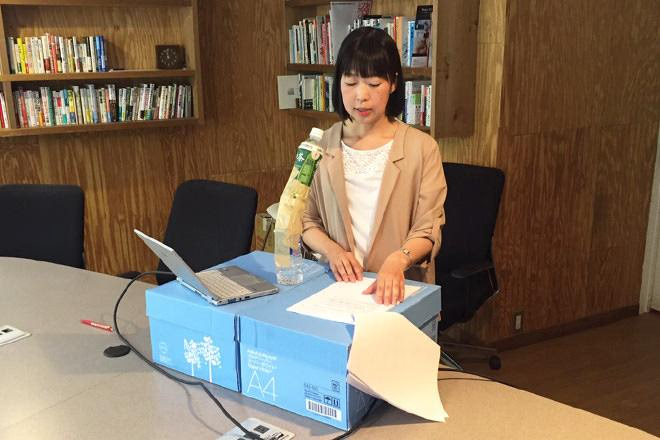
演台に見立てた段ボール箱と、ガムテープで繋ぎ合わせたペットボトルの手づくりマイクで練習
そして、セミナー当日。
今回のセミナーは、参加しやすい時間帯にしようと、夜開催になりました。
18時30分開場、19時開演~21時終演の2時間のプログラムです。
当日は、CF関係メンバー全員で会場入りしました。
会場は、東京・竹橋にあるマイナビ本社のセミナールームです。
隣に皇居を臨む超一等地です。
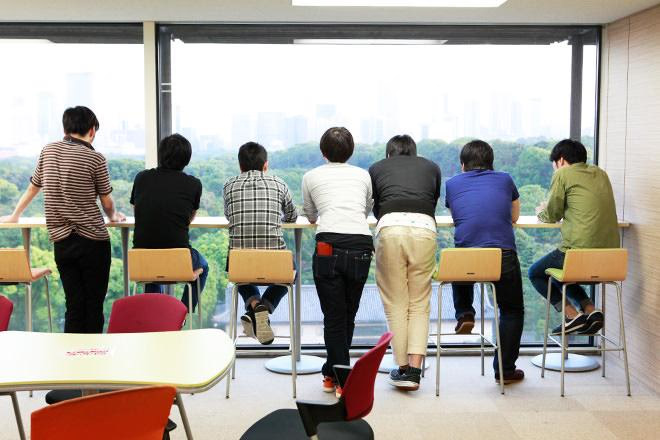
会場内の休憩室にて、絶景に群がるCFのコーダー達
準備は、今回のセミナーを主催していただいマイナビ出版様とともに、機材のセッティングやテキストの配布など、全員で行ないました。
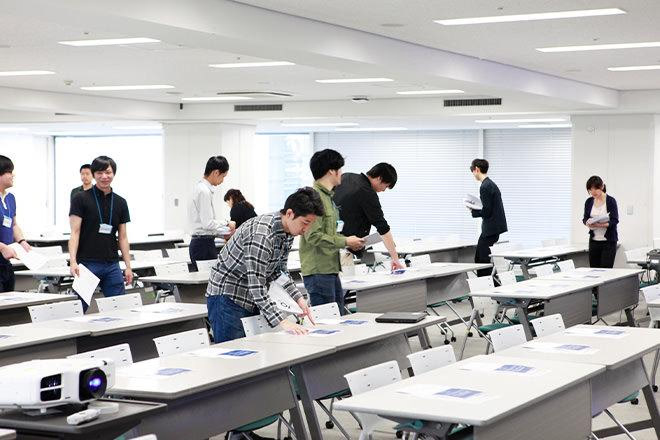
そして、開場。
今回のセミナーも、いつも通り、多くの方に集まっていただきました。
定員人数に設定していた80名を大きく上回り、97名のお申し込みをいただき、会場を広げて受講をいただきました。
いよいよ、講座スタートです。
今回のセミナーのテーマは、書籍と同じく「早く正確なWeb制作のために、現場で本当に必要なことは何か?」です。
高度化し、複雑化する Web 制作の環境のなかで、コーディングを担当する我々だからこそお伝えできる内容に絞って講座を構成しています。
第1講座、第2講座ともに、明日から現場で使える実践的な内容にかみ砕いた内容です。
まず、第1講座は、児嶋です。
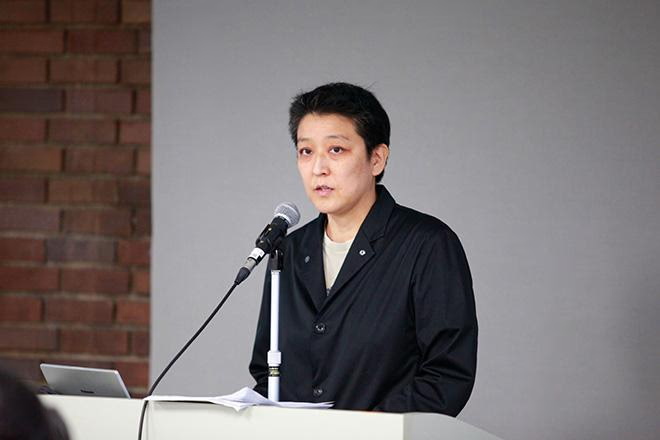
Web 制作が複雑化する中、仕様設計すべき項目が抜け漏れやすくなっているという現状があります。第1講座では、そのような漏れをなくすために作成したチェックシートをもとに、各項目の解説を行ないました。
第2講座の講師は、セミナーデビューを果たした松原です。
第2講座は、速く正確な Web 制作のために欠かせない Web 制作ツールの使いどころと効果的な使い方の解説を行ないました。
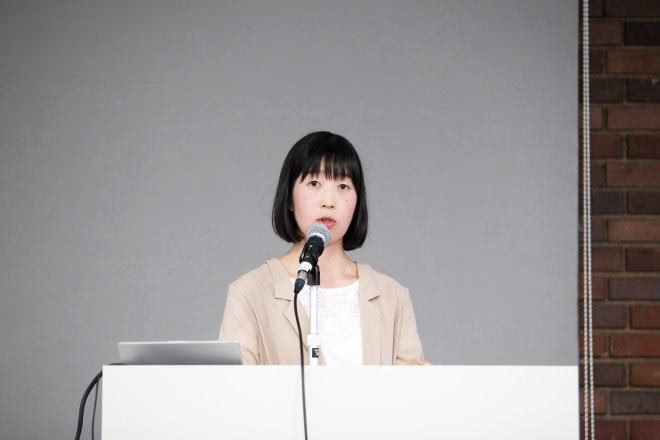
ド緊張の表情は、ご愛嬌です。
そして、セミナー終了。
バタバタの1ヵ月でしたが、参加いただいた皆様、主催いただいたマイナビ出版様のおかげで、盛況のもとにセミナーを終了することができました。
なぜ、セミナーを続けるのか
Web 業界では、日々、多くのセミナーが開催されています。
しかし、CF のセミナーは少し毛色が違います。
営業を目的としたセミナーが多い中、技術者から技術者へのノウハウ・技術の伝搬を目的としているからです。
セミナーを1本やりきるのは、稼働的にも精神的にも本当に大変です。
しかし、少々無理をしてでも、続けていきたいと思っています。
その根底にあるのは、不遜かもしれませんが「 Web 業界をよくしたい」という想いです。
CF をスタートした2007年当時は、Web 業界の生産性は決して高くはありませんでした。
それを揶揄する言葉を聞いたこともあります。
その現実を変えていくために自分達に何ができるかというのが、事業を続けていく上での一つのテーマとしてありました。
そのテーマを実行に移すキッカケは、自分達のポジションを改めて知った時でした。
CF は、主に Web 制作会社様からコーディングパートを任されるポジションです。
Web 制作会社様と進める日々の業務の中で、少しずつではありますが、ノウハウや経験が我々に貯まっていきます。それは何をおいても、案件を任せてもらえるからこそです。
「少しずつ貯まっていくものを還元する。それを生産性アップに役立ててもらう。」
還元こそが自分達にできることだと考えています。
それが、今回、出版そしてセミナーという形で実現できたことを嬉しく思うのと同時に、今後もこの活動を続けていきたいと思っています。
最後に、今回のセミナーの大阪での開催が決定しました。
日時は、8月7日(月)18時30分開演です。
関西圏の皆様のご参加をお待ちしています。
そして、CFメンバーの熱い想いが詰まった一冊はこちらです。
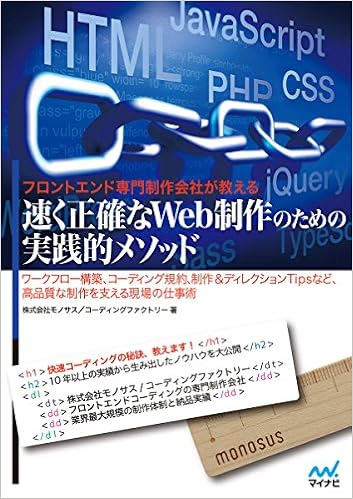
株式会社モノサス/コーディングファクトリー(著)
『フロントエンド専門制作会社が教える 速く正確なWeb制作のための実践的メソッド』
